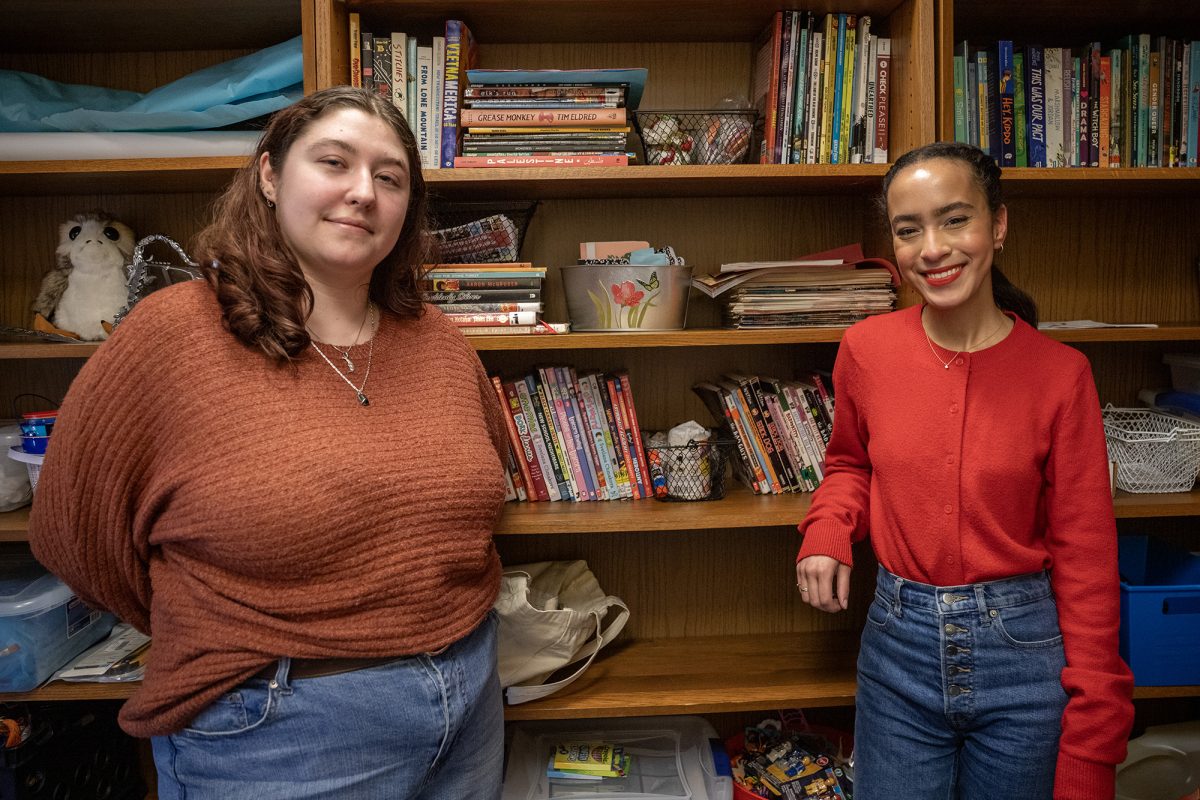
Lucia Iandolo
From left, Meaghan Burke and Riley Rhoder, student leaders of GNAB community efforts, stand in front of one of the many bookshelves in GNAB's personal closet.
Graphic novels are more than just entertainment — they are a gateway to literacy, creativity and diverse storytelling. At this year’s ITHACON on April 5 and 6, students from Ithaca College’s Graphic Novel Advisory Board are bringing their passion for comics beyond the classroom, offering attendees a chance to explore the power of graphic novels in education and library collections.
At Ithaca College, GNAB is made up of students enrolled in the credit-bearing English course, Professional Development Practicum, taught by Katharine Kittredge, professor in the Department of Literatures in English. In the course, students review graphic novels and collaborate with libraries to host activities. Kittredge said GNAB actively works to make graphic novels more accessible to readers of all ages through monthly newsletters, community events and presentations.
Founded in 2018, GNAB was established at the college to help libraries overhaul their graphic novel collections. While this was successful in its early years, Kittredge said the COVID-19 pandemic forced the group to alter its approach.
“We pivoted to focusing on the newsletter and received feedback from rural librarians that this was more useful to them, since a large part of their job is purchasing new titles,” Kittredge said.
GNAB publishes “The GNAB Review,” a monthly newsletter distributed to over 100 librarians nationwide. The newsletter features synopses, content warnings and recommendations on new graphic novels spanning a wide range of genres and themes, helping librarians curate more inclusive and well-rounded collections. Senior Riley Rhoder, an English major and GNAB’s newsletter editor, said the board’s members provide thorough insight into each title.
“The newsletter ensures underrepresented voices are represented in the graphic novels we review,” Rhoder said. “We also give insight into why we like a book, why we think libraries should shelve it and who the potential audience might be.”
Kittredge said GNAB has expanded its programming to include free, interactive workshops for libraries and community spaces. She said these events, including “Comics Chaos” and “Comics, Crafts and Superheroes,” aim to engage young readers with hands-on activities that foster creativity.
“From my time on the Board of Trustees for the Lisle Free Library, I saw how expensive it can be for libraries to bring in outside programming for children,” Kittredge said. “Offering these programs for free allows attendees to connect with ‘big kids’ who love reading and art the way they do.”
Kittredge said GNAB’s presence at ITHACON highlights its dedication to promoting graphic novels as an essential literary medium. One of its main contributions to the convention is the Graphic Novel Reading Room, a quiet space where attendees can relax and explore an extensive reading selection.
“Every year more people seek us out,” Kittredge said. “Last year, over 90 people visited the reading room.”
Rhoder also said that the room is meant to be an inclusive space at the convention.
“One of the students she was working with when she created the room specifically wanted it to be a space for neurodivergent people who might be overstimulated at ITHACON,” Rhoder said.
Kittredge said that in addition to the reading space, GNAB members will be speaking about graphic memoirs, diving into the history of the genre and how it grew out of the underground ‘Comix’ scene from the 1960s and 1970s. She said the club aims to provide a strong list of recommendations to convention attendees that they otherwise would not have known of.
GNAB will also host a “Comics, Crafts and Superheroes” event for young attendees. Sophomore Hailey Hubbard, a GNAB member, said the event will include superhero-themed activities like creating superhero shields, making friendship bracelets and playing an interactive game where kids complete tasks around the room to build their hero’s strengths.
“We’ve done these activities at Tompkins County Public Library recently,” Hubbard said. “We always make sure that there’s something for everyone and fully encapsulates the people we encounter.”
Kittredge said the course also provides valuable professional experience. Beyond ITHACON, she said GNAB’s outreach efforts have had a profound impact on both students and community members. For IC students, the organization provides hands-on experience in writing proposals, creating programs and working with children.
“Putting out ’The GNAB Review’ gives students experience editing and writing and allows them to list publications on their resume,” Kittredge said. “When employers contact me, I can share examples of how they’ve handled challenges, collaborated and engaged with the public.”
Kittredge said GNAB’s work also makes a difference for young readers, particularly those in underserved communities.
“We’ve done programming in some of the poorest and most isolated areas around Ithaca,” Kittredge said. “The librarians have told us that one of the benefits for the kids has been getting to meet and interact with college students, since they are often from families where no one has ever attended college.”
Hubbard said that making graphic novels more accessible is important, particularly for underrepresented communities.
“Everyone deserves access to creativity and art,” Hubbard said. “Creative [media] such as graphic novels can improve someone’s sense of belonging and connect them to other people. It’s especially needed nowadays in this era of attacking arts [that are] showing minorities.”